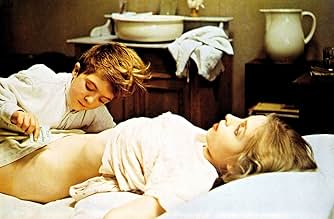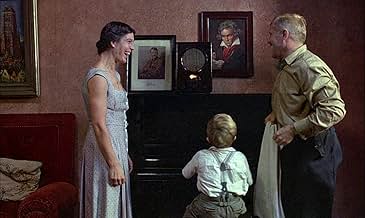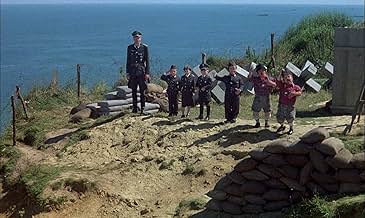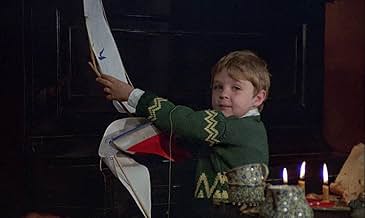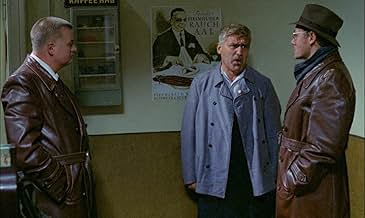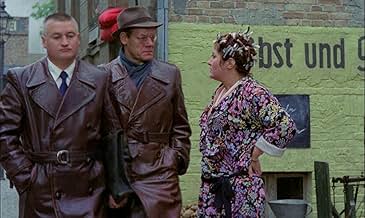En 1924, Oskar Matzerath nace en la ciudad libre de Danzig. A los tres años, se cae por las escaleras y deja de crecer. En 1939, estalla la Segunda Guerra Mundial.En 1924, Oskar Matzerath nace en la ciudad libre de Danzig. A los tres años, se cae por las escaleras y deja de crecer. En 1939, estalla la Segunda Guerra Mundial.En 1924, Oskar Matzerath nace en la ciudad libre de Danzig. A los tres años, se cae por las escaleras y deja de crecer. En 1939, estalla la Segunda Guerra Mundial.
- Ganó 1 premio Óscar
- 18 premios y 6 nominaciones en total
- Lina Greff
- (as Andréa Ferreol)
- Der Alte Heilandt
- (as Helmuth Brasch)
Argumento
¿Sabías que...?
- CuriosidadesDavid Bennent has a condition which caused him to grow very slowly. When he appeared in this film at age 11, he was 1.14 meters (3 ft. 9' in.) tall. He continued to grow to 1.55 m (5 ft. 1 in), and was still growing well into his thirties.
- PifiasWhile the German soldiers attack the Polish post office, one fires an MG42 machine gun from his shoulder. The German army didn't use that weapon before 1942. It's also not supposed to be fired while standing.
- Citas
Oskar Matzerath: There once was a drummer. His name was Oskar. He lost his poor mama, who had eat to much fish. There was once a credulous people... who believed in Santa Claus. But Santa Claus was really... the gas man! There was once a toy merchant. His name was Sigismund Markus... and he sold tin drums lacquered red and white. There was once a drummer. His name was Oskar. There was once a toy merchant... whose name was Markus... and he took all the toys in the world away with him.
- Versiones alternativasAlthough reluctant to do so the BBFC were forced to remove 19 secs from UK cinema and video versions under the Protection of Children Act to remove a scene showing Oskar pressing his face against Maria's pubic region. The cuts were waived in 2003 when it was decided that the scene did not constitute an indecent image.
- ConexionesFeatured in Pieces of Silver (1989)
The Tin Drum is based on Gunter Grass's highly acclaimed novel which used magic realism to capture the madness of war, and the folly of the people who made it possible. This movie only tackles the first two sections of the novel, leaving out the post-war events. The film won the Academy Award for Best Foreign film in 1980, and the Palm d'Or at Cannes. It was also banned in Oklahoma as "child pornography". Despite moments of brilliance, The Tin Drum left me feeling incomplete and curiously unmoved.
It is a very different kind of film from the others I saw this week, using satire and surrealism to explore people's reactions during the period from 1939 to 1945. It seems to be saying that it is all right to stop growing (that is, participating in the world) as a protest against the cynicism and corruption of the adult world. The setting for the majority of the film, Danzig (now Gdansk) is a major northern port town in Poland. Danzig was a free and independent city until September 1, 1939, when it became the first region taken by Germany at the outset of WWII. After the war, Danzig became a part of Poland again.
The Tin Drum is the story of Oskar Matzerath, a boy who grows up in Eastern Germany before and during World War II. Oskar decides the only way to protest being part of the adult world is by banging on his drum and remaining a child forever. This is his rebuttal of society and his tin drum is his protest against the mentality of his family and neighborhood, or perhaps against all passive people in Nazi Germany at that time. Oskar tries to shock the world out of its inhumanity. His life reflects Germany's struggle to free itself from its own dream of Teutonic superiority and find peace in the national soul.
David Bennent as Oskar gives an outstanding performance, creating a character that is both haunting and frightening. He looks like a little man in a child's body but his eyes are deep and have a very knowing look that seemed to be looking right through me.
Oskar is not a cute little updated version of Peter Pan. Since age three (when he was given his first tin drum), Oskar can scream with such a high pitch that he can shatter any piece of glass. He even controls his scream to the point where he can break windows on the other side of the city, or etch writing into glass. Oskar uses his ability to manipulate and control the adult world, often using vicious and cynical snide comments about the insanity around him. At one point, he disrupts a Nazi rally by changing the beat of his tin drum to the Blue Danube which the band then follows. The ensuing scene where the crowd breaks into a dance and the rain comes down leaving the Nazi soldiers bewildered is one of the best in the film.
I found the scenes where Oskar joins a midget troupe and finds loving companions of his own kind to be very tender and moving. However, the film became morally ambiguous for me when Oskar and his troupe decide to entertain the Nazi soldiers at the front lines. Schlondorff never really makes it clear what his motivations are and Oskar's actions seems to contradict his essentially anarchist protest for most of the film. The Tin Drum also contains some objectionable scenes of childhood sexuality and grotesque depictions of slithering eels being caught using a severed horse head as bait. The result, needless to say, is stomach churning.
I found The Tin Drum to be absorbing and thought provoking yet, despite moments of brilliance, for me it did not add up to a totally satisfying experience.
- howard.schumann
- 4 ago 2002
- Enlace permanente
Selecciones populares
Detalles
- Fecha de lanzamiento
- Países de origen
- Sitio oficial
- Idiomas
- Títulos en diferentes países
- El timbal de llauna
- Localizaciones del rodaje
- Wedding, Berlín, Alemania(synagogue fire)
- Empresas productoras
- Ver más compañías en los créditos en IMDbPro
Taquilla
- Recaudación en todo el mundo
- 7469 US$
- Duración2 horas 22 minutos
- Color
Contribuir a esta página



